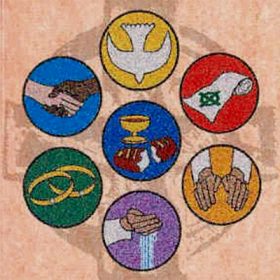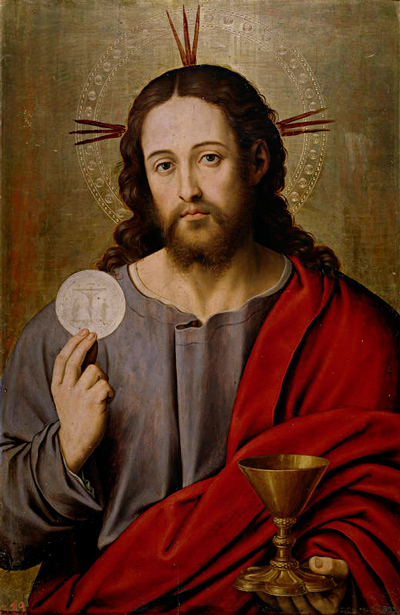What is a Sacrament?
Why do we need to participate in the sacramental life of our Catholic communities? What does the word sacrament mean? Why are the sacraments so important for Catholics?
The sacraments are the signs and instruments by which the Holy Spirit spreads the grace of Christ, the head, throughout the church which is his body (Col 1:18). Seated at the right hand of the Father, and pouring out the Holy Spirit on his body which is the church, Christ now acts through the sacraments he instituted to communicate his grace. The seven sacraments are perceptible signs, which by the action of Christ and the power of the Holy Spirit make present efficaciously the grace that they signify. Let's go little by little...
Sacraments are Signs

Sacraments are always the union of words, signs and actions. In human life, we express spiritual realities through physical signs and symbols. We need signs and symbols to communicate with others. We draw a heart when we want to express love. We shake hands when we want to offer our friendship. The use of symbols is a necessary form of communication. God also speaks to us through his visible creation. Sacraments are woven from signs and symbols: water (washing), oil (anointing), bread and wine (sharing at the table), etc., they receive from the Holy Spirit and the word of God the power to accomplish what they signify (purification, healing, communion with God, etc.).

Sacraments are Efficacious
They're not mere symbols. They're efficacious because in them Christ himself is at work: it is he who baptizes, he who forgives, he who gives us his own body and blood, and he who acts in each and every sacrament.
Sacraments were Instituted by Jesus
Adhering to the teaching of the holy Scriptures, to the apostolic traditions and to the consensus of the fathers, we profess that the sacraments of the new law were all instituted by Jesus Christ our lord.
Sacraments Impart Grace
Jesus' passion, death and resurrection is a real event that occurred in our history, but it's unique: all other historical events happen once, and then they pass away, swallowed in the past. Jesus' passion, death and resurrection, by contrast, cannot remain only in the past, because by his death he destroyed death, and all that Christ is – all that he did and suffered for all men - participates in the divine eternity, and so transcends all times while being made present in them all.
Catholic liturgy not only recalls the events that saved us but actualizes them and makes them present. The paschal mystery of Christ is celebrated, not repeated. It's the celebrations that are repeated, and in each celebration there's an outpouring of the Holy Spirit that makes the unique mystery present.
The Seven Sacraments
The seven sacraments are: baptism, confirmation, reconciliation, the Eucharist, the anointing of the sick, matrimony, and holy orders. The seven sacraments touch all the stages and all the important moments of Christian life. They give birth and increase healing and mission to the Christian's life of faith. There's a certain resemblance between the stages of natural life and the stages of the spiritual life. They accompany us from birth through youth and maturity until we part from this world.

